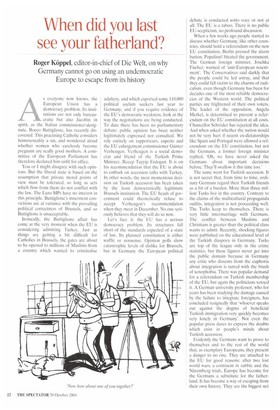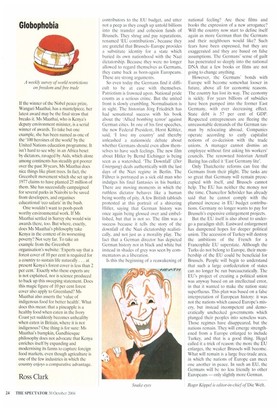When did you last see your fatherland?
Roger Koppel, editor-in-chief of Die Welt, on why Germany cannot go on using an undemocratic Europe to escape from its history
As everyone now knows, the European Union has a democracy problem. Its institutions are not only bureaucratic but also Jacobin in spirit, as the Italian commissioner-designate, Rocco Buttiglione, has recently discovered. This practising Catholic considers homosexuality a sin, and wondered aloud whether women who carelessly become pregnant are really good mothers. A committee of the European Parliament has therefore declared him unfit for office.
You or I might disagree with such opinions. But the liberal state is based on the assumption that private moral points of view must be tolerated, so long as acts which flow from them do not conflict with the law. The Euro MPs have no interest in this principle. Buttiglione's innermost convictions are at variance with the prevailing political correctness of Brussels, and so Buttiglione is unacceptable.
Ironically, the Buttiglione affair has come at the very moment when the EU is considering admitting Turkey. Just as things are getting a bit difficult for Catholics in Brussels, the gates are about to be opened to millions of Muslims from a country which wanted to criminalise adultery, and which exported some 110,000 political asylum seekers last year to Germany; and if you require evidence of the EU's democratic weakness, look at the way the negotiations are being conducted. To date there has been no parliamentary debate: public opinion has been neither legitimately expressed nor consulted. We rely entirely on rapporteurs, experts and the EU enlargement commissioner Gunter Verheugen. Verheugen is a social democrat and friend of the Turkish Prime Minister, Recep Tayyip Erdogan. It is on his recommendation that the EU is about to embark on accession talks with Turkey. In other words, the most momentous decision on Turkish accession has been taken by the least democratically legitimate Brussels institution. The EU heads of government could theoretically refuse to accept Verheugen's recommendation when they meet in December. No one seriously believes that they will do so now.
Let's face it: the EU has a serious democracy problem. Its structures fall short of the standards expected of a state of law. Its planned constitution is either waffle or nonsense. Opinion polls show catastrophic levels of dislike for Brussels, but in Germany the European political debate is conducted sotto voce or not at all. The EU is a taboo. There is no public EU-scepticism, no profound discussion.
When a few weeks ago people started to discuss whether Germany, like other countries, should hold a referendum on the new EU constitution, Berlin pressed the alarm button. Populism! bleated the government. The German foreign minister, Joschka Fischer, warned of 'anti-European resentment'. The Conservatives said darkly that the people could be led astray, and that they could fall victim to the charms of radicalism, even though Germany has been for decades one of the most reliable democracies of the Western world. The political parties are frightened of their own voters. The leader of the opposition, Angela Merkel, is determined to prevent a referendum on the EU constitution at all costs. Chancellor Schroder has rejected the idea. And when asked whether the nation would not be very hurt if recent ex-dictatorships like Spain and Portugal were allowed a referendum on the EU constitution, but not the Germans, a former foreign minister replied, 'Oh, we have never asked the Germans about important decisions before. They'll swallow it this time too.'
The same went for Turkish accession. It is not secret that, from time to time, ordinary Germans regard their Turkish friends as a bit of a burden. More than three million Turks live in the country. Contrary to the claims of the multicultural propaganda outfits, integration is not proceeding well. The Turks keep to themselves. There is very little intermarriage with Germans. The conflict between Muslims and Christians is greater than the political class wants to admit. Recently, shocking figures were published on the educational level of the Turkish diaspora in Germany. Turks are top of the league only in the crime statistics, but these figures never get into the public domain because in Germany any critic who dissents from the euphoria about integration is tarred with the brush of xenophobia. There was popular demand for a referendum on Turkish membership of the EU, but again the politicians vetoed it A German university professor, who for years has been studying the damage caused by the failure to integrate foreigners, has concluded resignedly that 'whoever speaks out against the dogma of beneficial Turkish immigration very quickly becomes very lonely in Germany'. Not even the popular press dares to express the doubts which exist in people's minds about Turkish accession.
Evidently the Germans want to prove to themselves and to the rest of the world that, as exemplary Europeans, they present a danger to no one. They are attached to the EU for good reasons: after two lost world wars, a continent in rubble and the Ntiremberg trials, Europe has become for the Germans a substitute for the fatherland. It has become a way of escaping from their own history. They are the biggest net If the winner of the Nobel peace prize, Wangari Maathai, has a mantelpiece, her latest award may be the final straw that breaks it. Ms Maathai, who is Kenya's deputy environment minister, is a serial winner of awards. To take but one example, she has been named as one of the '100 heroines of the world' by the United Nations education programme. It isn't hard to see why: in an Africa beset by dictators, ravaged by Aids, which alone among continents has steadily got poorer over the past 30 years, Ms Maathai does nice things like plant trees. In fact, the Greenbelt movement which she set up in 1977 claims to have planted 25 million of them. She has successfully campaigned for several parks in Nairobi to be saved from developers, and organises educational 'eco safaris' in the bush.
One wouldn't want to pooh-pooh worthy environmental work. If Ms Maathai settled in Surrey she would win awards there, too. But where, exactly, does Ms Maathai's philosophy take Kenya in the context of its worsening poverty? Not very far. To take an example from the Greenbelt Organisation's website: 'Experts say that a forest cover of 10 per cent is required for a country to sustain life naturally. . . at present Kenya's forest cover is less than 2 per cent.' Exactly who these experts are is not explained, nor is science produced to back up this sweeping statement. Does this magic figure of 10 per cent forest cover also apply to Greenland? Ms Maathai also asserts the 'value of indigenous food for better health'. What does this mean: that a pineapple is a healthy food when eaten in the Ivory Coast yet suddenly becomes unhealthy when eaten in Britain, where it is not indigenous? One thing is for sure: Ms Maathai's bumpkin, Gandhiesque philosophy does not advocate that Kenya enriches itself by expanding and modernising its farms to capture foreign food markets, even though agriculture is one of the few industries in which the country enjoys a comparative advantage.
Ross Clark
contributors to the EU budget, and utter not a peep as they cough up untold billions into the transfer and cohesion funds of Brussels. They shrug and pay reparations, renamed 'EU contributions', because they are grateful that Brussels–Europe provides a substitute identity for a state which buried its own nationhood with the Nazi dictatorship. Because they were no longer allowed to regard themselves as Germans, they came back as born-again Europeans. These are strong arguments.
So even today the Germans find it difficult to be at ease with themselves. Patriotism is frowned upon. National pride counts as a serious crime. But the united front is slowly crumbling. Normalisation is in sight. The historian Jarg Friedrich has had sensational success with his book about the 'Allied bombing terror' against German cities. In one of his first speeches, the new Federal President, Horst Kohler, said, 'I love my country' and thereby unleashed a nationwide debate about whether Germans should even allow themselves to have such feelings. The new film about Hitler by Bernd Eichinger is being seen as a watershed. The Downfall' (Der Untergang) deals authentically with the last days of the Nazi regime in Berlin. The Fuhrer is portrayed as a sick old man who indulges his final fantasies in his bunker. There are moving moments in which the ruthless dictator behaves like a human being worthy of pity. A few British tabloids protested at this portrait of a shivering Hitler, saying that German history was once again being glossed over and embellished, but that is not so. The film was a success because it tells the story of the downfall of the Nazi dictatorship realistically, and not just as a morality play. The fact that a German director has depicted German history not in black and white but instead in shades of grey was seen by commentators as a liberation.
Is this the beginning of a reawakening of national feeling? Are these films and books the expression of a new arrogance? Will the country now start to define itself again as more German than the Germans and their neighbours would like? Such fears have been expressed, but they are exaggerated and they are based on false assumptions. The Germans' sense of guilt has penetrated so deeply into the national DNA that a few books or films are not going to change anything.
However, the Germans' bonds with Europe will become somewhat looser in future, above all for economic reasons. The country has lost its way. The economy is sickly. For years billions of subsidies have been pumped into the former East Germany, with ever decreasing effect. State debt is 57 per cent of GDP. Respected entrepreneurs are fleeing the unreasonable demands of the German taxman by relocating abroad. Companies operate according to early capitalist notions of co-decision with the trade unions. A manager cannot dismiss an employee without first asking his workers' councils. The renowned historian Arnulf Baring has called it 'East Germany lite'.
Only Thatcherite reforms can free the Germans from their plight. The tasks are so great that Germany will remain preoccupied with itself, and Brussels cannot help. The Eli has neither the money nor the time. Chancellor Schrader has already said that he cannot comply with the planned increase in EU budget contributions. Germany no longer wants to pay for Brussels's expensive enlargement projects.
But the EU itself is also about to undergo a paradigm shift. Eastward enlargement has dampened hopes for deeper political union. The accession of Turkey will destroy the ambitions of the French for a Francophile EU superstate. Although the Turks do not belong to Europe, their membership of the EU could be beneficial for Brussels. People will begin to understand that such a large confederation of states can no longer be run bureaucratically. The EU's project of creating a political union was anyway based on an intellectual error, in that it wanted to make the nation state superfluous. This plan was based on a false interpretation of European history: it was not the nations which caused Europe's misery, but instead incompetent and democratically unchecked governments which plunged their peoples into senseless wars. Those regimes have disappeared, but the nations remain. They will emerge strengthened from a Europe enlarged to include Turkey, and that is a good thing. Hegel called it a trick of reason: the more the EU enlarges, the weaker Brussels will become. What will remain is a large free-trade area, in which the nations of Europe can meet one another in peace. In such an EU, the Germans will be no less friendly to other Europeans — only slightly more German.



















































































































 Previous page
Previous page